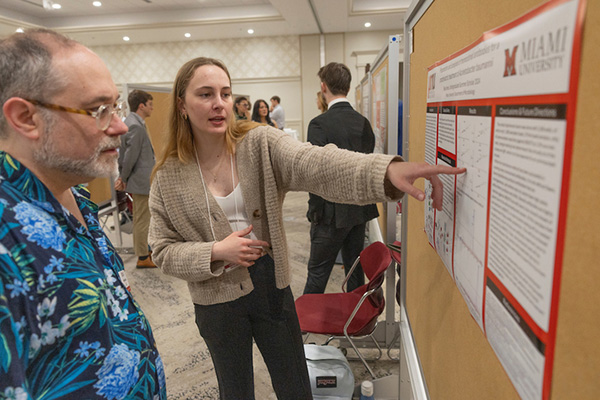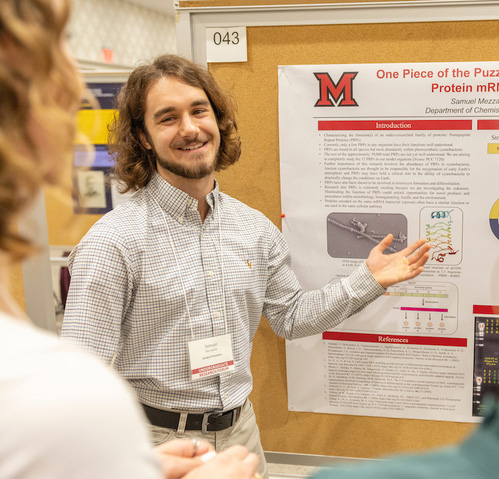Student researchers celebrate growth and mentorship at 31st Undergraduate Research Forum
Annual forum highlights student opportunities for research experiences across disciplines

Student researchers celebrate growth and mentorship at 31st Undergraduate Research Forum
Over and over at the Undergraduate Research Forum on April 25, students repeated how their projects not only provided a path to probe their passions through an academic lens but also allowed them to embrace new research experiences and improved their confidence. Many students also highlighted the relationship with their faculty mentor as instrumental to getting their project off the ground.
This year’s forum hosted 378 individual students presenting their research through posters or 10-minute talks. Brenda Stevens, formerly an assistant professor of Educational Psychology, recounted how her late husband John Czaja, professor emeritus of Psychology and associate director of Miami’s Office for the Advancement of Research and Scholarship (OARS), started the forum more than 30 years ago. On Friday morning, Stevens meandered through the rows of poster presentations, inquiring students on their projects.
“I enjoy talking to the students and seeing them begin their future track, pursue their interests, and to see how they have worked with faculty and the public to start their careers. It’s very exciting to have a preview for the future. If they continue their research, we’re headed in the right direction,” Stevens said, adding that she was thrilled that Miami has continued the forum and is a model for undergraduate research.

This year’s forum featured a wide array of research projects, from biology, chemistry, and physics to history, political science, and even creative writing. Anthropology major Chester Stander’s research project, titled “Reaching Back Through Our History,” focused on how paleoanthropology professionals and adjacent professionals interact with our prehistoric ancestors, and how their personal identities and experience shape those interactions.
Originally a Nursing major, Stander changed to Anthropology after attending a course taught by his faculty mentor, associate professor of Anthropology John Schaefer.
“I was really inspired hearing him talk about doing fieldwork and research,” Stander said. “He did a lot of ethnographic work in Morocco about music and folklore and I was like ‘I want that to be me someday.’”
Stander said he’s become a lot more confident when it comes to conducting research, highlighting the support he’s not only received from their mentor but others involved in undergraduate research.
Molly Weeldreyer, an Urban and Regional Planning and Creative Writing double major, echoed this sentiment. Her project, which addressed beach accessibility for people with limited mobility in the Chicago area, started as research on erosion. But when she realized she was more interested in concentrating on accessibility, she was able to shift her project with help from her mentor, Damon Scott, associate professor of Geography.
“I never saw myself actually being part of a research project,” Weeldreyer said. “My leap was responding yes to an email saying, ‘Hey, do you want to turn this into something bigger?’” Her advice: don’t be afraid to take opportunities when they come because there will be people along the way to help you.
Emily Martin, a Biology major and Premedical Studies co-major, conducted psychology research examining the relationship of disordered eating, anxiety and depression, and weight stigma within the LGB community. The project pushed her out of her comfort zone, but assistant professor of Psychology Jeffrey Hunger, her mentor, guided her on how to collect and analyze the data needed for the project.
“I’ve learned so much about myself, what I love, and how I want to treat my patients in the future,” Martin said, adding that students shouldn’t be afraid to try something different for their own research projects.
And if they don’t know where to start on finding a topic or even a mentor? Martin recommended finding a professor you share a common interest with and reading what they’re up to: “What does their research look like? What are they doing in the lab every day? Why is this important to them? Why does it matter to the world?”